 Petzlover
Petzlover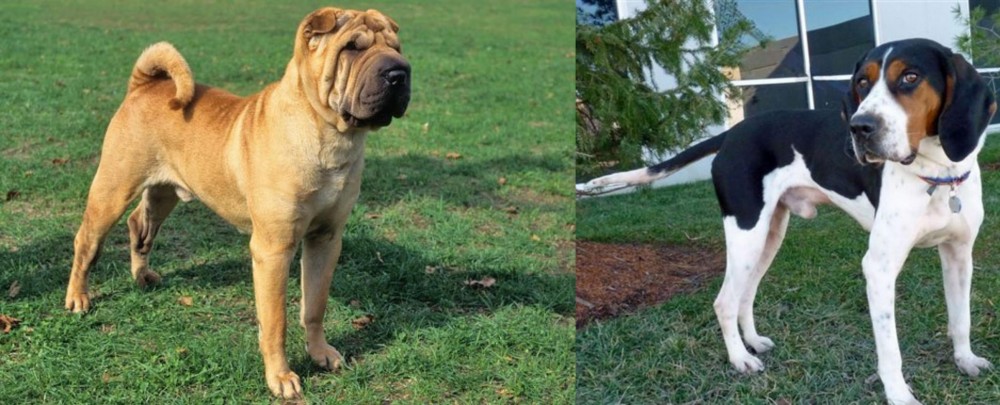 Chinese Shar Pei is originated from China but Treeing Walker Coonhound is originated from United States. Chinese Shar Pei may grow 13 cm / 5 inches shorter than Treeing Walker Coonhound. Chinese Shar Pei may weigh 7 kg / 15 pounds lesser than Treeing Walker Coonhound. Both Chinese Shar Pei and Treeing Walker Coonhound has almost same life span. Both Chinese Shar Pei and Treeing Walker Coonhound has same litter size. Chinese Shar Pei requires Moderate Maintenance. But Treeing Walker Coonhound requires Low Maintenance
Chinese Shar Pei is originated from China but Treeing Walker Coonhound is originated from United States. Chinese Shar Pei may grow 13 cm / 5 inches shorter than Treeing Walker Coonhound. Chinese Shar Pei may weigh 7 kg / 15 pounds lesser than Treeing Walker Coonhound. Both Chinese Shar Pei and Treeing Walker Coonhound has almost same life span. Both Chinese Shar Pei and Treeing Walker Coonhound has same litter size. Chinese Shar Pei requires Moderate Maintenance. But Treeing Walker Coonhound requires Low Maintenance
 The Chinese Shar-Pei is originally from Canton, China. The Shar-Pei has a blue-black tongue and many deep wrinkles. They have more wrinkles as a puppy than the adult dogs do. They are one of the rarest breeds in the world and are considered a basal breed – meaning their existence predates modern canines. Most canines are related to the gray wolf through genetic admixture. However, there are breeds like the Siberian Husky, the Greenland Dog, Finnish Spitz and the Shar Pei are all related to the Taymyr Wolk of North Asia through admixture. The Shar Pei is found throughout the centuries in Chinese artwork, especially found during the Han Dynasty, and are considered one of the most ancient of breeds on earth today. In this period, they were fighting dogs then became beloved pets. Today the Tibetans still use them as fighting dogs.
The Chinese Shar-Pei is originally from Canton, China. The Shar-Pei has a blue-black tongue and many deep wrinkles. They have more wrinkles as a puppy than the adult dogs do. They are one of the rarest breeds in the world and are considered a basal breed – meaning their existence predates modern canines. Most canines are related to the gray wolf through genetic admixture. However, there are breeds like the Siberian Husky, the Greenland Dog, Finnish Spitz and the Shar Pei are all related to the Taymyr Wolk of North Asia through admixture. The Shar Pei is found throughout the centuries in Chinese artwork, especially found during the Han Dynasty, and are considered one of the most ancient of breeds on earth today. In this period, they were fighting dogs then became beloved pets. Today the Tibetans still use them as fighting dogs.
Following the Communist Revolution, the Char Pei was almost extinct until Margo Law saved the breed. During this time, they smuggled around 200 dogs into the United States. All the dogs in the United States today come from those 200 dogs. They were accepted in 1992 into the AKC. The dogs served as trackers, hunters, ratters, guard dogs and herders.
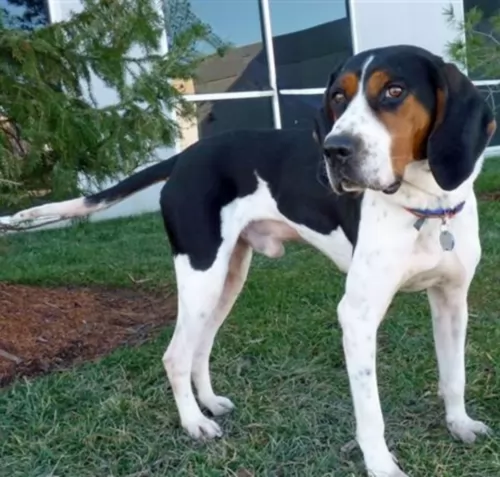 The Treeing Walker Coonhound originated in the United States and comes from English and American Foxhounds.
The Treeing Walker Coonhound originated in the United States and comes from English and American Foxhounds.
The fact that the dog has the word ‘Treeing’ in its names means that it is a hound dog that runs after its prey, sending it running up a tree to escape until the hunter reaches the tree and can shoot the prey.
 The Chines Sar Pei has what if known as a Horse-coat which is prickly, harsh, and rough to the touch on one direction and rough to touch on the other. Western Shar Peis can be Horse, Bearcoat and Brush. The Brush is longer and smoother while the Bear coat is rare and in-between the two. The Bearcoat is not accepted by the AKC while the other two types of coats are.
The Chines Sar Pei has what if known as a Horse-coat which is prickly, harsh, and rough to the touch on one direction and rough to touch on the other. Western Shar Peis can be Horse, Bearcoat and Brush. The Brush is longer and smoother while the Bear coat is rare and in-between the two. The Bearcoat is not accepted by the AKC while the other two types of coats are.
The Shar Pei should have a hippo shaped head, a black-purple tongue, black mouth, deep set almond shaped dark eyes, small ears and red coats. His profile is square, and his muzzle is full and wide. Most Shar Peis only have facial and neck wrinkles left as adults.
 The Treeing Walker Coonhound looks very similar to a Beagle, just with much longer legs.
The Treeing Walker Coonhound looks very similar to a Beagle, just with much longer legs.
He stands at between 51 and 69cm in height both male and female and it weighs between 23 and 32kg.
The coat is short and glossy being either bi- or tri-colored – white, tan and black. The body and legs are strong and muscular. He has fairly long, floppy ears. The eyes are brown, intelligent and alert while having quite a gentle expression.
The muzzle is long and narrow. He has large, floppy pendant ears. The eyes are large, brown and have a soft and gentle expression. The tail is set high and is long.
This breed may be an excellent sport dog but he loves spending time quietly with his human family too, making a great family pet.
He is gentle and makes a great playmate for disciplined children. He is intelligent and it will do both owner and dog the world of good to have him trained and socialized.
They’re stubborn dogs, so it simply makes him well behaved, balanced and a pleasure to have around. He will learn commands easily and readily. If you want a good family pet, the Treeing Walker Coonhound is even-tempered and non-aggressive.
 The Shar Pei must be socialized early to other people, children and animals if he is to be friendly with them. He is loyal to his people and instinctively wary of strangers. He will be completed devoted to his people, but he is reserved and independent. They can be aggressive and territorial if not socialized. They are stubborn, loving and loyal. They are dominant, brave and playful. They are great watch dogs. Keep them busy because they tend to think a lot independently and if they don’t have a job they may create one.
The Shar Pei must be socialized early to other people, children and animals if he is to be friendly with them. He is loyal to his people and instinctively wary of strangers. He will be completed devoted to his people, but he is reserved and independent. They can be aggressive and territorial if not socialized. They are stubborn, loving and loyal. They are dominant, brave and playful. They are great watch dogs. Keep them busy because they tend to think a lot independently and if they don’t have a job they may create one.
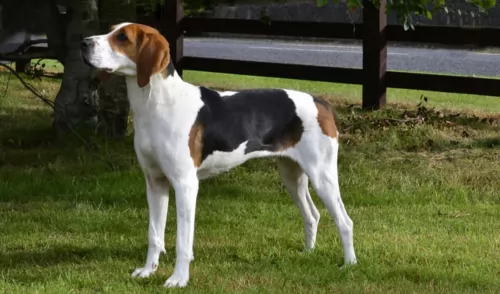 These dogs are loving, loyal confident, social and intelligent, making good companion dogs.
These dogs are loving, loyal confident, social and intelligent, making good companion dogs.
Whether they're outdoors being full of energy and on a hunt, they always give of their best. When they're at home with their human family, they put work behind them and become gentle, mellow pets, loving to just take it easy with their human family.
 Because of the rushed and inexperienced breeding programs in the United States due to the popularity of the breed, there are many health issues in the North American version of the Shar Pei. Their life expectancy is generally under ten years. They are prone to:
Because of the rushed and inexperienced breeding programs in the United States due to the popularity of the breed, there are many health issues in the North American version of the Shar Pei. Their life expectancy is generally under ten years. They are prone to:
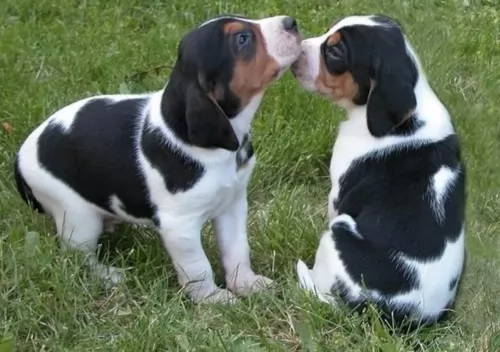 The Treeing Walker Coonhound is looked upon as a healthy dog breed that can be 10 – 13 years of age. Even so, there are diseases that can plague him, and hip dysplasia and ear infections are two that you need to be aware of.
The Treeing Walker Coonhound is looked upon as a healthy dog breed that can be 10 – 13 years of age. Even so, there are diseases that can plague him, and hip dysplasia and ear infections are two that you need to be aware of.
This is when the ball and socket joint isn't formed properly so that there is a grinding action of the joint instead of it sliding smoothly. This common skeletal disease is found in young and old dogs, and it seems more prevalent in larger dog breeds.
Your dog will have pain in the hip joints and even loss of muscle mass in the thigh area. You’ll notice that he becomes less active. Your dog will need to get to the vet so that the vet can suggest treatment for pain and to make him more comfortable.
As a floppy-eared dog, the Treeing Walker Coonhound will scratch at his ears and shake his head if he has an ear infection. With an ear infection inflammation affects the ear canal and can result in deafness. With his floppy ears moisture within the ear can attract bacteria and yeast.
Your pet will need to get to the vet because an ear infection is a painful condition.
 Feed a good quality dry dog food but do not overfeed. You should feed twice a day about one cup per six pounds for puppies. Adults should have two cups a day.
Feed a good quality dry dog food but do not overfeed. You should feed twice a day about one cup per six pounds for puppies. Adults should have two cups a day.
• Familial Shar Pei Fever – congenital and serious. This produces fevers that can last from 24 hours to three days. Swelling around the ankles is due to fluid retention.
• Entropion eye issues – eyelashes curl in and inflame the eye. Can cause blindness if not treated. Requires surgery.
Both as a puppy and an adult this is a pretty active dog. He needs at the very least to be walked every day or have a back yard to play in. They are sensitive to heat so bring them in when its really hot and don’t walk them in the heat. They love to play, are athletic and competitive. Try agility, tracking, rally and obedience trials.
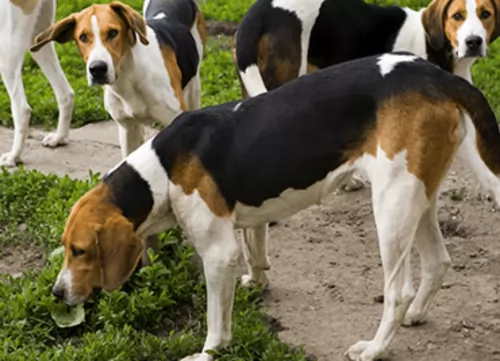 ● A healthy diet with vitamins and minerals as well as essential fatty acids is imperative. To get this in a commercially manufactured dog food, you will need to buy the best, high-quality ones. Some of the inferior brands have all kinds of bad stuff in them such as colorants preservatives and fillers.
● A healthy diet with vitamins and minerals as well as essential fatty acids is imperative. To get this in a commercially manufactured dog food, you will need to buy the best, high-quality ones. Some of the inferior brands have all kinds of bad stuff in them such as colorants preservatives and fillers.
Try and give him some homemade food such as boiled chicken, brown rice and vegetables. Dogs want simplicity in their foods. They can't stomach highly spiced, salted and exotic foods. Plain, wholesome foods keep him healthy and happy.
● It is recommended that you have your dog spayed or neutered. Not only will you prevent an unwanted litter, having them spayed or neutered prevents serious diseases later on. Also, have
your Treeing Walker Coonhound immunized to prevent some of the deadly canine diseases there are.
●These dogs are active, sporty dogs known for their stamina. To keep them lean, athletic and fit, they will require lots of exercise. They love a walk but will require more than a regular walk. Hikes are more what they have in mind. They never tire of hectic ball games, hide and seek and swimming. Because they are active, alert and intelligent dogs, they will need mental stimulation too.
● Your Treeing Walker Coonhound isn't a high maintenance dog because their short coat is easy to keep groomed just by giving him a good brush once or twice a week.
Make the grooming session a time to check him over for ticks and fleas and any unusual lumps on his body. It's a time to look at his eyes to make sure they're clear and bright without any discharge. Check inside his ears for redness and infection.
Trim his nails too. Remember he can't tell you about his teeth, so try and look inside his mouth to see that all is well. A good sign of bad teeth is bad breath. There are professional groomers who are willing to do all these grooming chores for you.